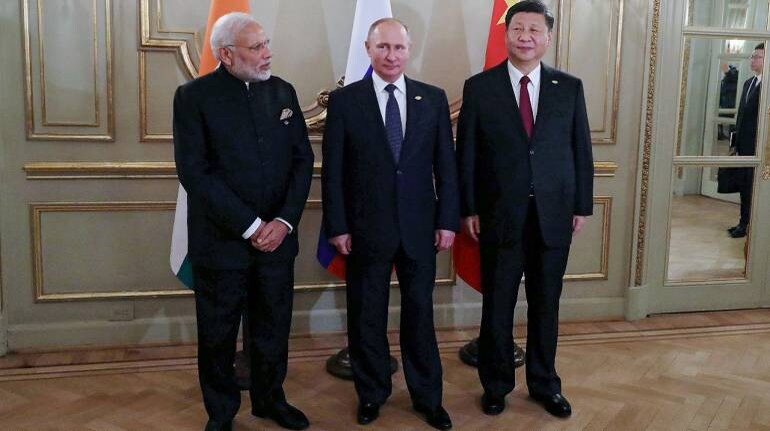



The visit of Chinese President Xi Jinping to Moscow last month and the summit he had with his Russian counterpart Vladimir Putin has sharply divided opinion among Indian experts.
Since it took place in the backdrop of the ongoing Ukraine war, commentators have been speculating about how the current situation is likely to increase Russia’s dependence on China and turn it into a junior partner in their bilateral relationship.
The statements issued at the summit have been parsed to ascertain how they will impact India.
India and China have been locked in a military stand-off along the Line of Actual Control (LAC) — their informal frontier — since May 2020.
Despite several rounds of talks, both sides have maintained a heavy deployment of troops at the disputed border over the past months.
The Indian leadership has stated that relations between the two neighbours cannot be normal until China restores peace and tranquillity at the border, which it had disrupted.
But India’s relations with Russia are different.
Russia is India’s closest strategic ally and largest supplier of weapons and military spares. The two countries also signed an agreement in December 2021 for a 10-year military-technical cooperation.
Moscow’s importance to Delhi has increased significantly because of the military stand-off at the LAC.
India and China are among the countries that have refused to condemn Russia for its invasion of Ukraine despite pressure from America and European countries.
In the past, Russia had turned down China’s suggestion that it withhold arms supplies to India amid the border stand-off.
Changing dynamic
But questions are now being raised about whether Russia’s growing dependence on China in the wake of the Ukraine war and the crippling sanctions imposed on it by the US and its western allies, will allow Moscow to maintain an independent stand while dealing with India.
According to former Indian foreign secretary Shyam Saran, this gives “China much greater leverage over Russia and on the latter’s capacity to pursue independent relations with other states such as India”.
Saran said in his opinion piece in the Indian Express, “China now has the capacity to limit Russian engagement with India, including in defence.”
The former foreign secretary cautioned, “This must now enter our own foreign policy and security calculations.”
In its latest foreign policy strategy document, Russia has described China and India as its two allies.
But Saran says, “In the case of India, this may be more a case of wishful thinking.”
However, there is another view among Indian policymakers, who think writing off Russia would be a mistake just as it would be to assume that Russia would play second fiddle to China’s interests.
“The bilateral joint statement dropped the phrase 'friendship without limits’,” says Venkat Verma, India’s former ambassador to Russia, referring to the statement issued by the two countries after the Xi-Putin summit in Moscow last month.
He argues that its inclusion in the February 2022 Joint Statement was widely misinterpreted as reflecting the true nature of their strategic partnership.
“It was a case of deliberate exaggeration which, having served its purpose, has been discarded,” he added.
Verma feels Russian weakness and continuing US pressure on Russia’s periphery is a godsend for China — as it is best positioned to occupy space at Russia’s expense in Eastern Europe, the Caucasus, the Black Sea and Central Asia.
Exaggeration risks
However, he warns that “there are risks in exaggerating the depth of the strategic partnership between Russia and China, often with the preferred conclusion that this is the best time for India to deepen its strategic embrace of the US.”
Verma wrote a paper on the growing Sino-Russian partnership and its likely impact on India for the Delhi-based think-tank Vivekananda International Foundation (VIF) last week.
He said, “There appears an unseemly haste among some analysts in promoting the line that India should see the writing on the wall, distance itself from Russia and seek so-called external balancing with a deeper alignment with the US bilaterally, with virulently anti-Russian countries such as Poland and the Baltics and through like-minded groupings like the Quad.”
According to him, embedded in these fanciful assessments is a deep-seated cognitive bias against Russia and a deep yearning to pivot towards America. “Neither by themselves add up to sensible strategic policy,” he adds.
The former Indian ambassador to Russia says that China’s current advantage with respect to Russia is not open-ended and it is highly unlikely that Russia will be willing to pay long-term geopolitical costs because of its current difficulties.
“Russia has seen India as an indispensable pillar of stability in Asia, as a counterbalance to China,” says Verma.
He adds, “This factor in Russian policy predates a similar factor in current US policy by several decades.”
A mirror interest for the US and China
Verma argues that on the other hand, it is China and the US that have a mirror interest in the weakening of the India-Russia defence partnership — one to reduce India’s defence potential and the other to move into the defence market vacated by Russia.
He says, “Amongst our foreign partners, Russia is still the best positioned to contribute to India’s Make-in-India defence programme as there is a previous history of cooperation.”
How weak or strong Russia will be in the coming days depends largely on the outcome of the Ukraine war.
For India, which is a proponent of a multipolar world order, and is trying to expand its strategic independence by maintaining strong relations with all major powers, Russia will remain its most trusted strategic partner.
Discover the latest Business News, Sensex, and Nifty updates. Obtain Personal Finance insights, tax queries, and expert opinions on Moneycontrol or download the Moneycontrol App to stay updated!